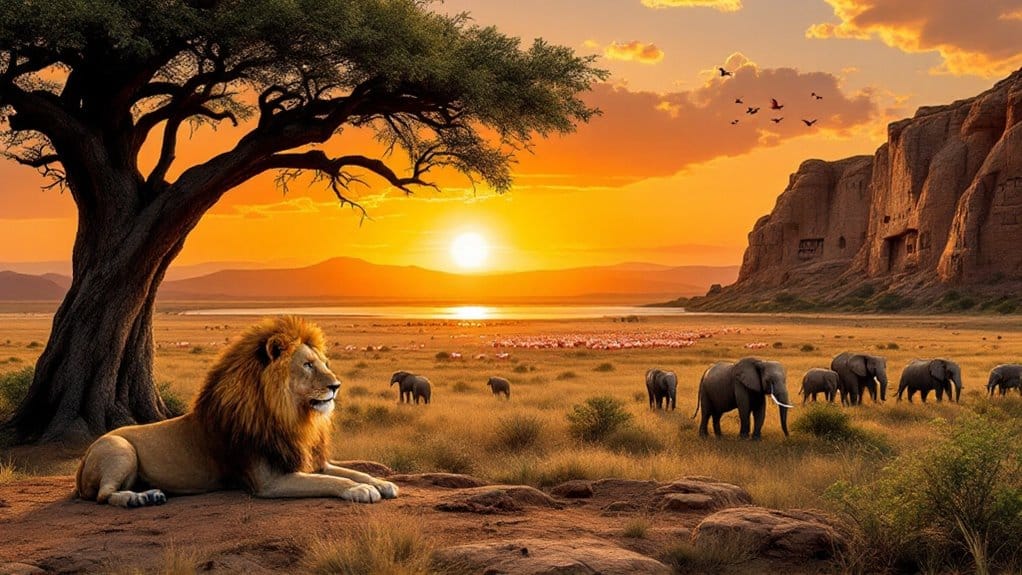You might find it surprising that while you're familiar with Africa's iconic wildlife, there are countless stories and treasures waiting to be uncovered. As you explore the continent's diverse landscapes, you'll encounter not only the majestic Big Five but also a rich tapestry of cultures and histories that often go unnoticed. What if you could engage with communities and experience their traditions firsthand? The journey offers more than just a visual feast; it invites you to connect with a heritage steeped in mystery and significance. What will you discover next?
Key Takeaways
- Explore diverse ecosystems like the Okavango Delta, home to unique wildlife and essential conservation efforts protecting endangered species.
- Discover ancient archaeological sites, such as the Giza Pyramid Complex, that showcase Africa's rich historical and cultural narratives.
- Experience vibrant local festivals, like the Ashanti Yam Festival, which celebrate food, culture, and community spirit across various ethnic groups.
- Engage with indigenous communities and participate in traditional activities, fostering cultural immersion and supporting sustainable tourism practices.
- Taste Africa's culinary delights, including Ethiopian injera and South African bobotie, which reflect the continent's diverse flavors and agricultural heritage.
Cultural Diversity Across Africa
Africa boasts an astonishing array of over 3,000 distinct ethnic groups, each contributing to the continent's vibrant cultural tapestry. This cultural diversity isn't just a statistic; it's a living, breathing expression of the uniqueness found in every corner of the continent.
When you engage with local people, you'll discover their rich traditions, languages, and customs, allowing you to appreciate the profound depth of their heritage.
Take part in traditional ceremonies, like the Maasai coming-of-age rituals or Ashanti festivals, and witness firsthand the colors, music, and stories that echo through generations. The interplay of Christianity, Islam, and traditional African religions showcases the continent's historical complexity, illustrating how communities blend beliefs into their daily lives.
Don't forget to indulge your taste buds in local culinary delights. From Ethiopian injera to Senegalese yassa, the regional dishes reveal a tapestry of flavors that tell their own stories.
Iconic Wildlife Experiences
Exploring the cultural richness of Africa naturally leads you to its breathtaking wildlife experiences, where the continent's stunning landscapes teem with life.
Picture yourself witnessing the majestic Big Five—lions, elephants, buffaloes, leopards, and rhinoceroses—roaming freely in their natural habitats across iconic national parks. You'll be captivated by the annual wildebeest migration in the Serengeti, one of the greatest natural spectacles on Earth, drawing millions of animals and visitors from around the globe.
For a more intimate encounter, tracking mountain gorillas in Uganda's Bwindi Impenetrable Forest offers you a unique experience, allowing you to connect deeply with these endangered creatures, all while supporting crucial conservation efforts.
Don't miss the Okavango Delta, a UNESCO World Heritage Site, known for its rich biodiversity and diverse ecosystems. Here, hippos and crocodiles thrive, offering unforgettable wildlife sightings.
With iconic landscapes like Victoria Falls not only showcasing nature's beauty but also serving as thriving wildlife habitats, Africa invites you to immerse yourself in its extraordinary wildlife experiences.
Join a community of adventurers and make unforgettable memories while exploring the incredible wildlife of Africa.
Conservation Initiatives and Challenges
Protecting Africa's rich wildlife heritage requires a concerted effort that balances ecological preservation with community needs. Conservation initiatives focused on the Big Five—lion, elephant, buffalo, leopard, and rhinoceros—are essential for ensuring these majestic animals thrive in their natural habitats.
Yet, the journey isn't solely about wildlife; it's about the communities that offer support and involvement in these efforts. For instance, local initiatives like caring for injured green sea turtles in Zanzibar highlight how community engagement can lead to ecological balance.
The annual wildebeest migration in the Serengeti underscores the necessity of preserving habitats and managing natural resources sustainably, which also benefits local livelihoods.
However, challenges remain. Urban pollution threatens both wildlife and the communities that depend on these ecosystems. Furthermore, mixed feelings towards tourism from local villagers often stem from past exploitation, emphasizing the need for ethical tourism practices.
Historical Sites and Archaeological Wonders
When you explore Africa's historical sites, you'll uncover a tapestry of human ingenuity and resilience.
From the awe-inspiring Giza Pyramid Complex to the ancient rock art that tells stories of prehistoric life, each site offers a unique glimpse into our shared heritage.
Don't miss the chance to witness UNESCO World Heritage Sites that preserve the complex narratives of culture, trade, and survival across the continent.
Ancient Rock Art Sites
Africa's ancient rock art sites stand as proof of the creativity and resilience of early human societies, inviting you to plunge into a world where art and history intertwine.
These remarkable sites reveal a rich archaeological heritage that showcases the lives, beliefs, and environments of our ancestors.
When you explore these treasures, you'll discover:
- The Drakensberg Mountains in South Africa, home to over 20,000 petroglyphs created by the San people more than 2,000 years ago.
- Namibia's Twyfelfontein, featuring around 2,500 rock engravings depicting animals, human figures, and hunting scenes, providing insight into prehistoric communities.
- The Tassili n'Ajjer region of Algeria, where over 15,000 drawings illustrate the evolution of human life and the surrounding environment over millennia.
Visiting these ancient rock art sites isn't just about witnessing art; it's about connecting with the spirit of our collective past.
Each engraving and drawing tells a story, linking you to the creativity and culture of early humans.
Embrace this opportunity to understand more about our shared heritage and the resilience that has shaped humanity throughout the ages.
UNESCO World Heritage Sites
While exploring the rich tapestry of Africa's cultural and historical landscape, you can't help but be drawn to its UNESCO World Heritage Sites, which stand as memorials to human ingenuity and resilience. These sites offer a profound connection to our shared cultural heritage, inviting you to witness the stories etched in stone and spirit.
| UNESCO World Heritage Site | Significance | Location |
|---|---|---|
| Giza Pyramid Complex | A Wonder of the Ancient World | Egypt |
| Lalibela | Rock-hewn churches, spiritual hub | Ethiopia |
| Timbuktu | Center of learning and trade | Mali |
| Goree Island | Reflection of the slave trade | Senegal |
Each site tells a unique story—like Lalibela's stunning architecture or the haunting memory of Goree Island's forts. As you immerse yourself in these places, you'll feel the pulse of history, connecting with the resilience of the human spirit. Experiencing these UNESCO World Heritage Sites isn't just about visiting; it's about belonging to a rich narrative that spans centuries, deepening your appreciation for Africa's vibrant cultural heritage.
Giza Pyramid Complex Insights
The Giza Pyramid Complex stands as a demonstration of ancient ingenuity, enchanting visitors with its monumental structures and rich history. This UNESCO World Heritage Site not only showcases the grandeur of African culture but also serves as a proof of the incredible achievements of ancient Egyptians.
When you explore this remarkable site, you'll find:
- The Great Pyramid of Giza, the oldest of the Seven Wonders, originally towering at 146.6 meters.
- The architectural marvels of the pyramids built for Pharaohs Khafre and Menkaure, each with its own unique features.
- The Great Sphinx, a guardian of the complex, believed to represent Pharaoh Khafre himself.
As you walk through the complex, you'll uncover archaeological treasures that continue to shed light on ancient Egyptian life. Discover tools, burial artifacts, and insights into the workforce that dedicated their lives to these monumental structures.
Each stone tells a story, connecting you to a civilization that shaped human history. Visiting the Giza Pyramid Complex allows you to embrace these rich Cultural Treasures and feel a sense of belonging to a heritage that transcends time.
Unique Landscapes and Natural Treasures
Across the vast continent, you'll discover an astonishing array of unique landscapes and natural treasures that showcase Africa's unparalleled beauty.
Madagascar, for instance, boasts over 90% of its wildlife found nowhere else on Earth, with enchanting lemurs and iconic baobab trees mesmerizing visitors.
As you explore Namibia's Skeleton Coast, you'll encounter its stark, rugged beauty, where shipwrecks and desert-adapted wildlife create a dramatic backdrop for adventurous souls like you.
The Okavango Delta in Botswana, a UNESCO World Heritage Site, offers a rich tapestry of diverse ecosystems shaped by seasonal flooding, inviting you to experience its vibrant flora and fauna firsthand.
Picture yourself standing within the Ngorongoro Crater in Tanzania, the world's largest inactive volcanic caldera, where a stunning landscape teems with Africa's wildlife, including the majestic Big Five.
And don't miss the breathtaking Victoria Falls, straddling Zambia and Zimbabwe, one of the largest waterfalls in the world.
This natural wonder is a must-see, drawing visitors year-round to witness its awe-inspiring power.
Embrace these unique landscapes, and you'll forge unforgettable memories while connecting with Africa's incredible heritage.
Engaging With Local Communities
Experiencing Africa's breathtaking landscapes is only part of the journey; engaging with local communities enriches your travels in a profound way.
When you immerse yourself in the lives of the people, you discover the heart of Africa's diverse cultures and traditions.
Here are three ways you can connect deeply:
- Participate in Traditional Activities: Join local ceremonies and learn firsthand about customs that have been passed down through generations. This lets you appreciate the rich tapestry of cultural experiences.
- Stay with Local Families: Community-based tourism initiatives offer you the chance to live with locals, providing authentic experiences that support their economic development while enriching your understanding of indigenous lifestyles.
- Volunteer: Get involved with grassroots organizations focusing on education or healthcare. Your contributions can create lasting impacts and strengthen connections between you and the community.
Artistic Expressions and Cultural Celebrations
When you explore Africa's artistic expressions and cultural celebrations, you'll discover a vibrant tapestry of traditional art forms that reflect the continent's rich heritage.
Festivals like Mali's Festival au Desert not only showcase local talent but also foster community spirit through shared experiences.
Engaging with these initiatives reveals how creativity and cultural pride unite people, enriching their lives and preserving their history.
Traditional Art Forms
Traditional art forms in Africa are vibrant expressions of cultural identity that reflect the continent's rich heritage.
These artistic expressions not only showcase the creativity of local artisans but also play an essential role in preserving cultural heritage. Engaging with these art forms, you can gain a deeper appreciation for the stories and traditions they embody.
Here are three key aspects to take into account:
- Masks and Ceremonies: Traditional African masks, often depicting animals and ancestral spirits, are integral to ceremonies. They serve as powerful symbols connecting the community to its history and beliefs.
- Dance as Storytelling: In countries like Senegal, traditional dance forms convey stories and rituals, uniting people through movement and music. Participating in these dances allows you to experience the essence of cultural expression firsthand.
- Culinary Arts: Local culinary practices reflect cultural identity, with unique dishes passed down through generations. They offer insights into agricultural heritage and communal values, enriching your understanding of the community.
Festivals and Celebrations
Festivals and celebrations in Africa create a vibrant tapestry of cultural expression that brings communities together. Each event showcases the continent's rich cultural heritage, inviting you to immerse yourself in its diversity.
Picture yourself at Mali's Festival au Desert or Morocco's Gnaoua World Music Festival, where the rhythms of highlife and jazz resonate, celebrating artistic talent and musical innovation.
In Zanzibar, the lively atmosphere during Ramadan and the Eid Festival transforms the island, with communal gatherings and the aroma of fresh baked goods filling the air. These celebrations beautifully reflect the island's rich Islamic heritage.
Traditional ceremonies, like the Maasai coming-of-age rituals and Ashanti festivals, reinforce community bonds, allowing you to witness the pride and joy of ethnic identities.
Art forms, from contemporary paintings to traditional masks depicting animals and ancestral spirits, reveal profound connections between African culture and its artistic expressions.
Engaging in these festivals and celebrations fosters a sense of belonging, as you support local craftsmanship and economic sustainability. By participating, you not only enjoy the festivities but also become part of a larger narrative that celebrates Africa's diverse cultural richness.
Community Engagement Initiatives
Engaging with community-based tourism initiatives in Africa allows you to dive deep into the continent's vibrant artistic expressions and cultural celebrations.
By participating, you not only support local families but also embrace cultural traditions that have thrived for generations.
Here are three ways you can immerse yourself in these enriching experiences:
- Festival Participation: Join in major music festivals like Mali's Festival au Desert, where local artists showcase their unique heritage through enthralling performances.
- Artistic Workshops: Attend workshops led by indigenous communities, where you can learn about traditional crafts and artistic expressions, fostering intercultural understanding and respect.
- Cultural Celebrations: Experience local festivities, such as the Eid Festival in Zanzibar, which highlights the importance of communal gatherings and the sense of belonging that comes with shared cultural practices.
Off the Beaten Path Adventures
When you venture off the beaten path in Africa, you'll uncover hidden gems that showcase the continent's breathtaking landscapes and rich cultural heritage.
Picture yourself exploring the remote beaches of Mozambique, where pristine coastlines and vibrant coral reefs invite you to snorkel and dive, far from the bustling crowds. Guided tours can lead you through Namibia's Skeleton Coast, revealing its rugged beauty, haunting shipwrecks, and unique desert-adapted wildlife that thrives in this enchanting environment.
In Madagascar, trek through untouched landscapes to encounter endemic species like lemurs and iconic baobab trees, highlighting the island's ecological significance.
As you visit ancient rock art sites in Namibia and South Africa, you'll gain insights into the rich prehistoric cultures that shaped Africa's artistic expressions. Engaging with indigenous communities, like the Himba people in Namibia, offers you firsthand experiences of traditional lifestyles and cultural practices, deepening your connection to Africa's diverse heritage.
These off-the-beaten-path adventures let you experience Africa's wildlife and cultural treasures in ways that few others do, inviting you to belong to a narrative that celebrates the continent's untold stories.
Culinary Delights and Traditions
Africa's culinary landscape invites you to commence on a delicious journey, where each region boasts its own unique flavors and traditional dishes that tell the story of its rich cultural heritage.
This diversity is a celebration of community, with meals often shared among family and friends, fostering a sense of belonging.
Here are three culinary delights you must explore:
- Injera from Ethiopia: This spongy flatbread serves as both a dish and a utensil, embodying the country's communal dining traditions.
- Bobotie from South Africa: A savory baked dish with a rich history, combining spices and ingredients that reflect the melting pot of cultures in the region.
- Samosas in East Africa: These delightful pastries filled with spiced meats or vegetables showcase the vibrant street food culture that thrives in cities across the continent.
As you savor these flavors, you'll appreciate the role of spices, festivals like the Ashanti Yam Festival, and the rich tapestry of culinary traditions that define African countries.
Embrace this journey, and let the world of African cuisine deepen your connection to its vibrant cultures.
Sustainable Tourism Practices in Africa
Sustainable tourism practices in Africa are reshaping the travel experience, allowing you to explore the continent's stunning landscapes while supporting local communities and wildlife conservation.
By choosing community-based initiatives, you not only gain insight into local cultures but also empower residents through guided tours that share their knowledge and traditions.
Conservation efforts play a crucial role in sustainable tourism, protecting species like green sea turtles and ensuring ecological balance.
When you engage in responsible tourism, you help preserve biodiversity, including the iconic Big Five and unique ecosystems like the Okavango Delta. In turn, your support aids local communities by addressing challenges in education and healthcare.
Eco-friendly accommodations and practices, such as waste management and conservation education, are becoming increasingly popular in tourist hotspots.
These initiatives contribute to a more sustainable industry and enhance your travel experience.
Additionally, immersing yourself in cultural experiences—like participating in traditional ceremonies or workshops with indigenous communities—fosters respect for local customs and deepens your understanding of Africa's rich heritage.
Frequently Asked Questions
What Are the Treasures Found in Africa?
Africa's treasures are incredible, waiting for you to explore.
You'll find rich cultural heritage in ancient sites like the Giza Pyramid Complex and Goree Island, offering deep historical connections.
The continent's natural wonders, from the majestic elephants of the Serengeti to Madagascar's unique lemurs, captivate every nature lover.
Engaging with local communities, you'll experience authentic traditions and support wildlife conservation, making your journey not just memorable, but meaningful.
Africa truly invites you to belong.
What Is the Spotted Scavenger of Africa?
You might think of the spotted hyena as a mere scavenger, but its behavior reveals much more.
These intelligent creatures play a crucial role in their ecosystems, actively hunting and maintaining balance by controlling prey populations.
Their complex social structures and distinctive vocalizations strengthen clan bonds, showcasing their ecological significance.
Conclusion
As you set out to uncover Africa's untold treasures, imagine standing face-to-face with a majestic elephant or witnessing a vibrant dance that echoes generations of tradition. With each step, you're not just a visitor; you're part of a larger story that intertwines wildlife, culture, and history. So, are you ready to commence this unforgettable journey that supports conservation and celebrates the rich tapestry of Africa? Your adventure awaits, filled with wonders beyond your imagination.




